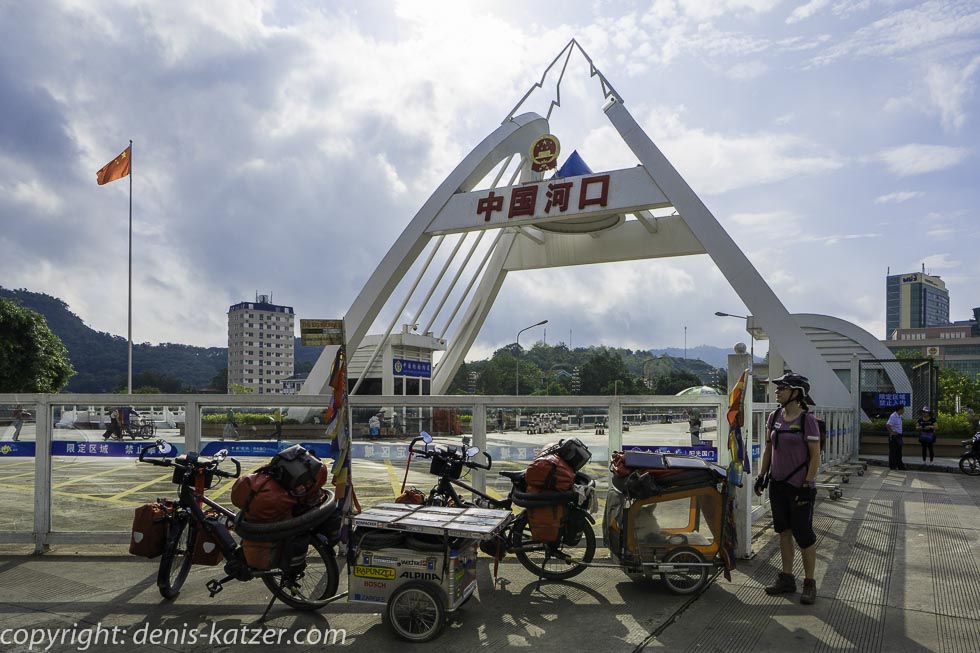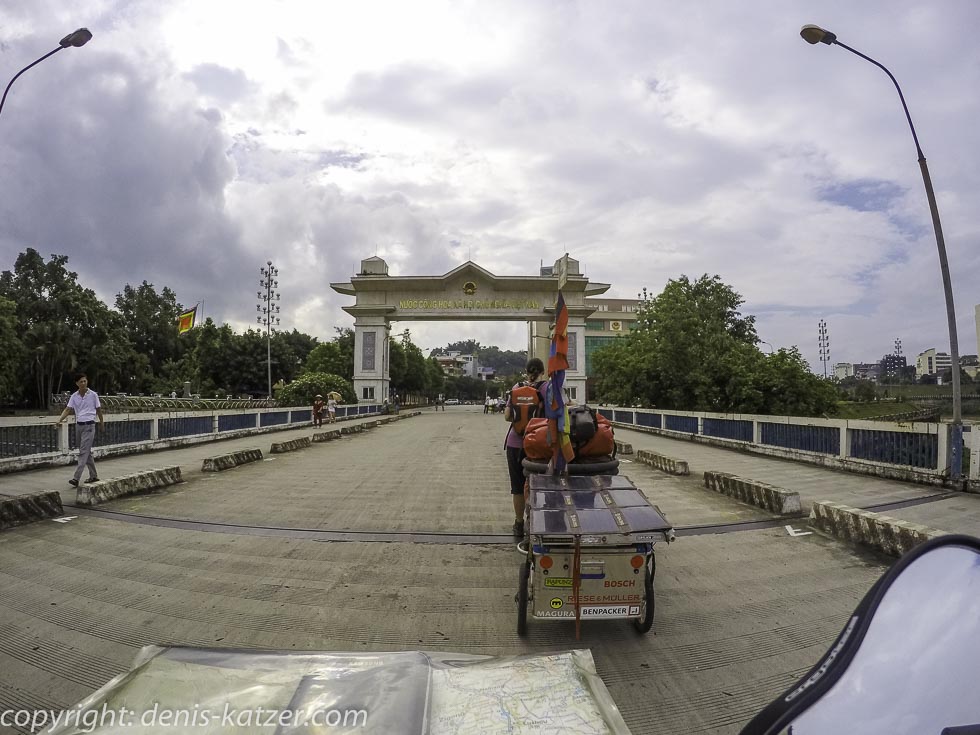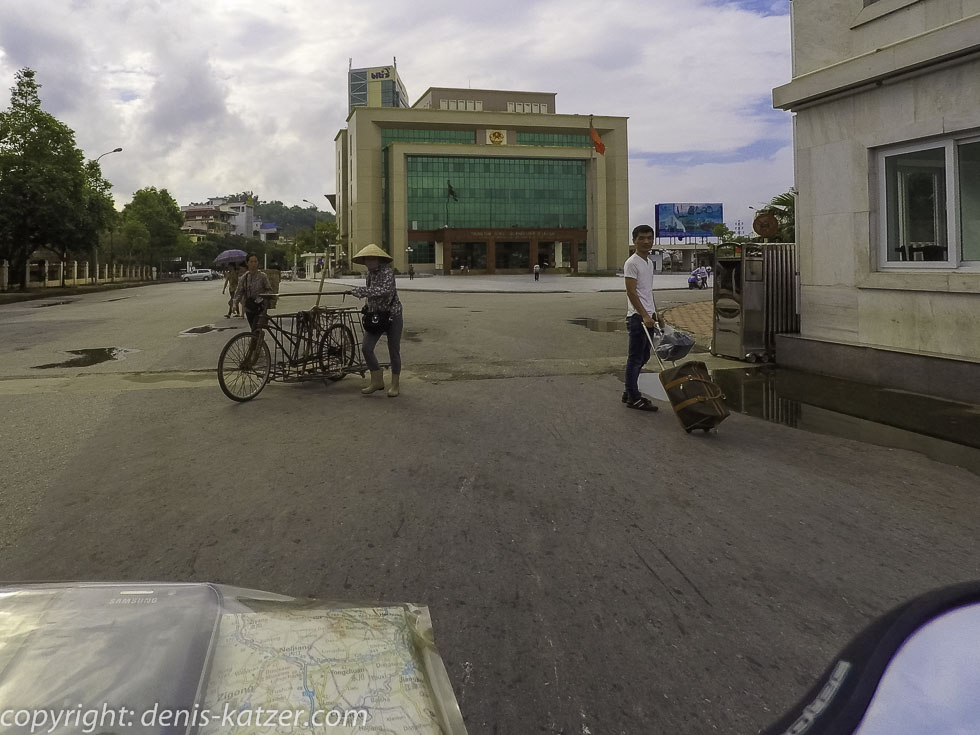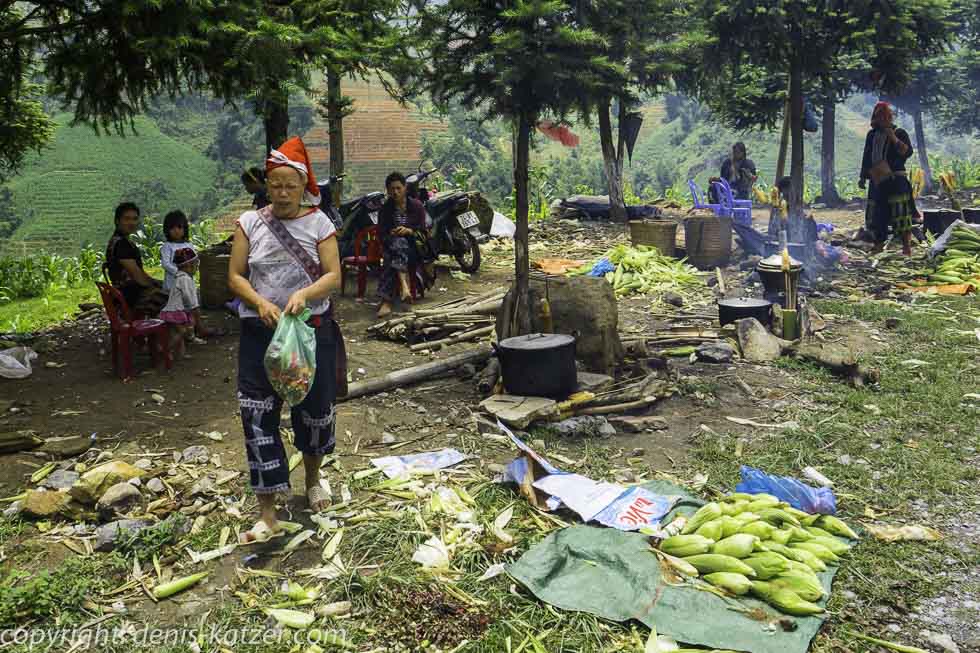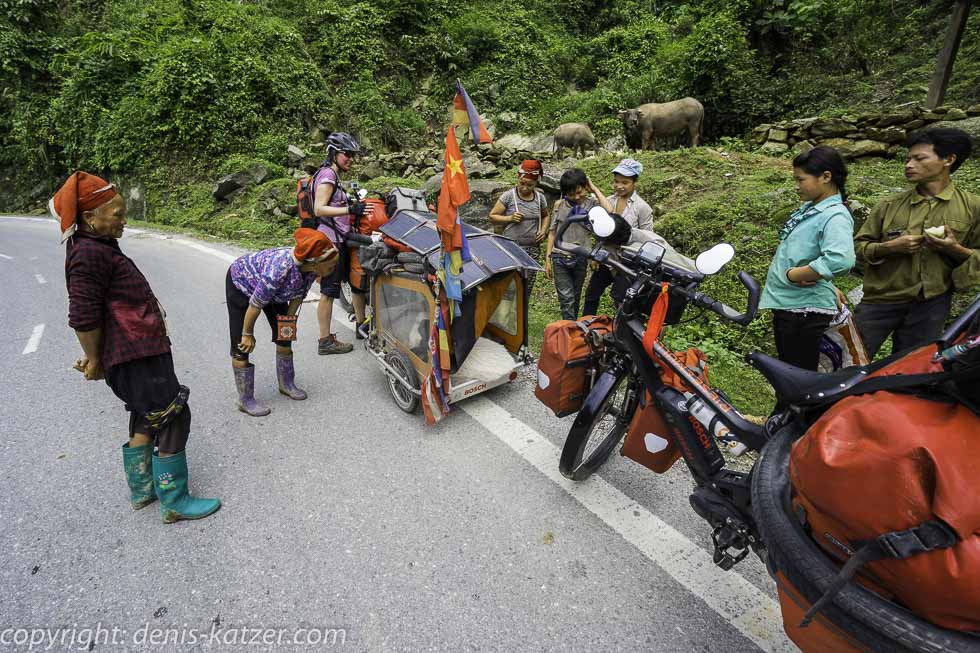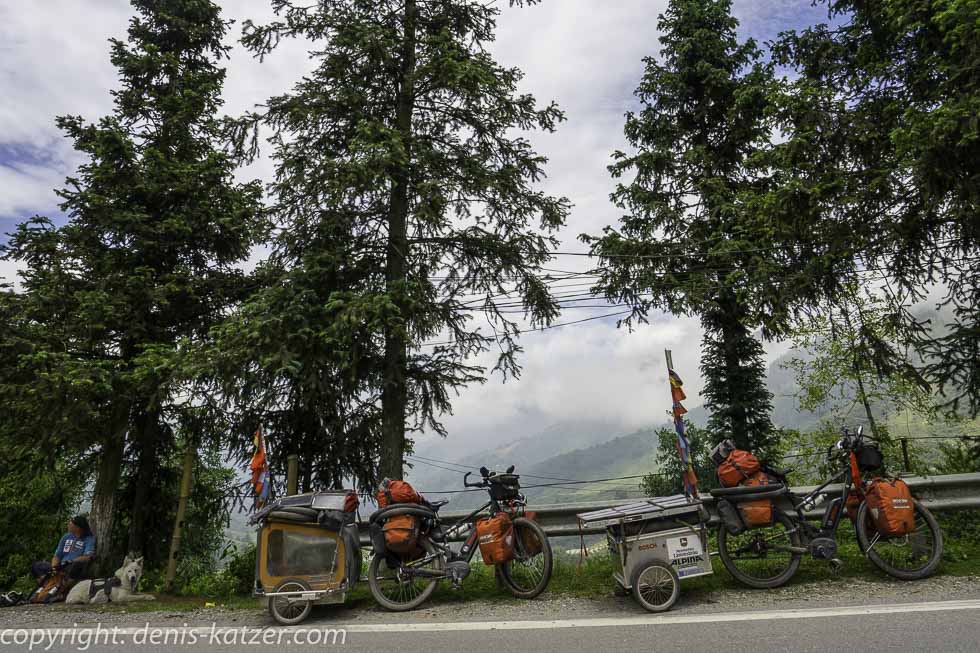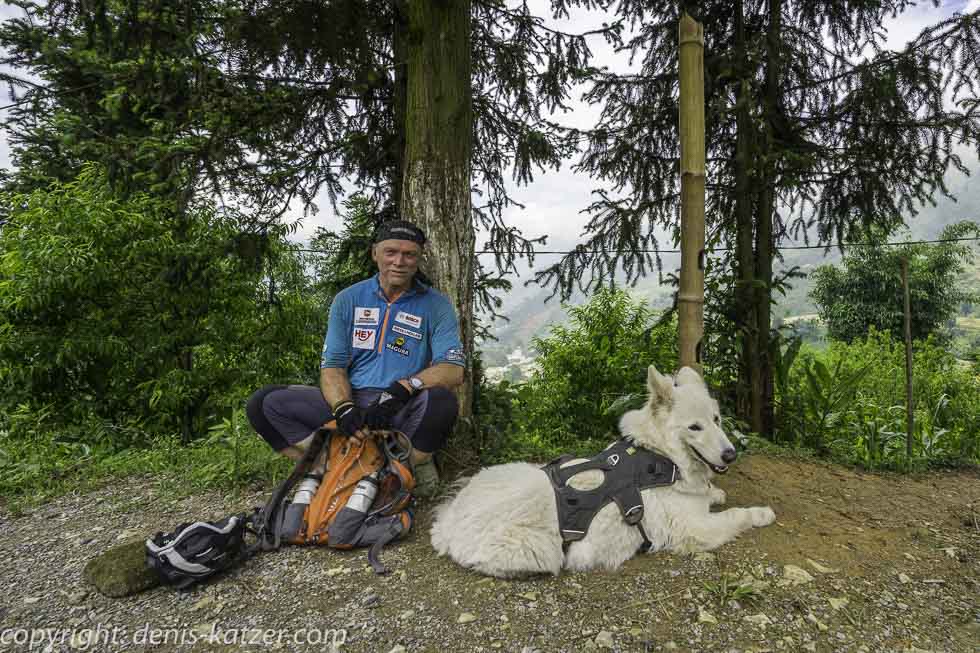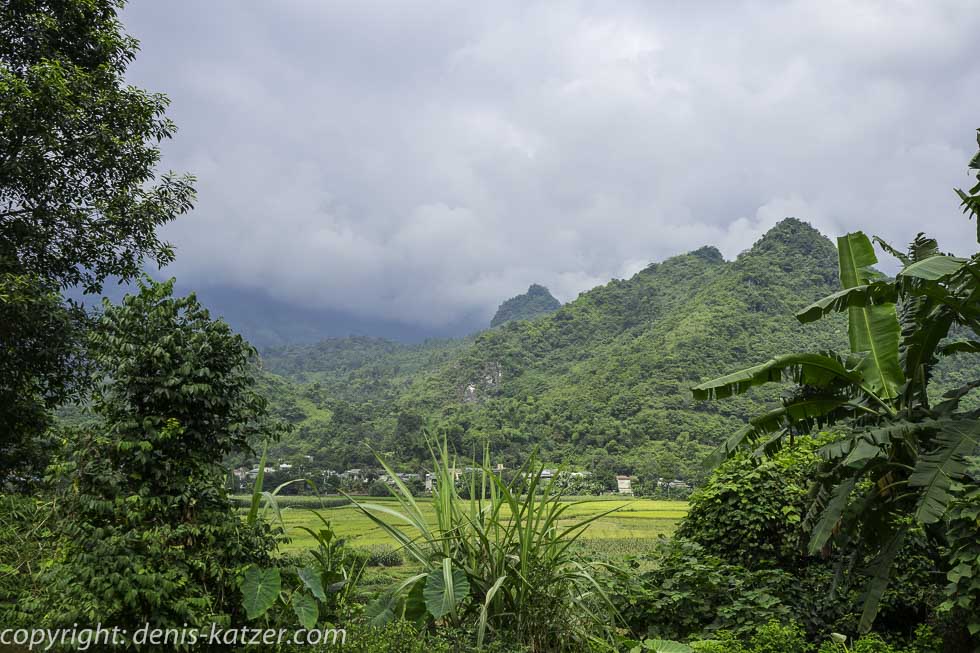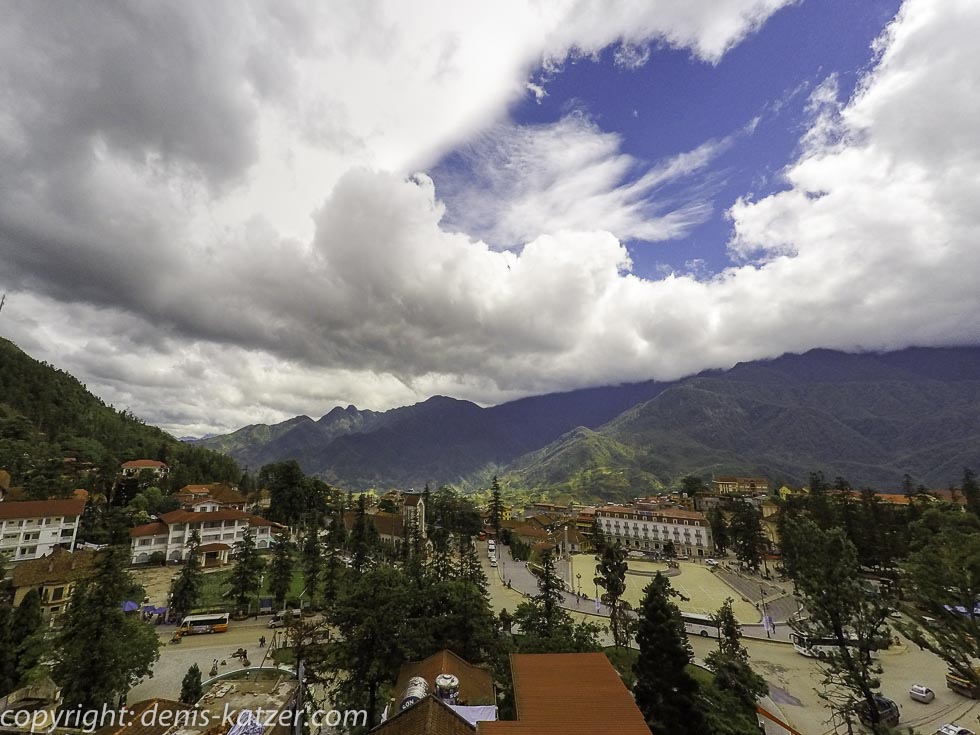
Prostitution at the border and first moments in Vietnam
N 22°20'11.0'' E 103°50'32.4''
Date:
31.05.2016 until 26.06.2016
Day: 339 – 365
Country:
Vietnam
Location:
Sa Pa
Latitude N:
22°20’11.0”
Longitude E:
103°50’32.4”
Daily kilometers:
37 km
Total kilometers:
17,382 km
As the crow flies:
22.62 km
Average speed:
11.3 km/h
Maximum speed:
37.4 km/h
Travel time:
03:10 hrs.
Soil condition:
Asphalt
Maximum height:
1.550 m
Total altitude meters:
43.793 m
Altitude meters for the day:
1.558 m
Maximum depth:
20 m
Sunrise:
05:20 h – 05:22 h
Sunset:
6:44 pm – 6:52 pm
Temperature day max:
36°C
Temperature day min:
25°C
Departure:
09:30 a.m.
Arrival time:
4:30 pm
(Photos of the diary entry can be found at the end of the text).
We arrived in the border town of Hekou five days before our visa was due to expire. So we had made up some time and used it to send a few items of equipment we no longer needed to Germany, write some updates and prepare for our border crossing to Vietnam.
Every evening we sat in a simple street restaurant, enjoyed the tropical heat of the lowlands and watched the vibrant life. Due to the immediate proximity to the border, there was massive prostitution in Hekou. Many of the pretty young women came from Vietnam and sought their fortune with the numerous Chinese clients who pay better than their compatriots. 90 percent of the guests at our street restaurant worked in the horizontal trade. Moped drivers took the girls somewhere where they were looked at and selected by rich men. The moped driver often chugged back to the restaurant with his three beauties after a short time. None were lucky enough to be selected. Sometimes, however, the man’s whole face was beaming, because the bench behind him was empty. The competition was enormous. The mopeds were constantly whizzing up and down the street with their hot goods. Women and their children were sitting at the next table. “These are the mediators,” an insider told us. Every evening, extremely expensive sports cars or SUVs were parked in the middle of the street. The casually dressed men got out, sat down at a table in front of us, ordered something to drink and chatted. Who knows which part of the mafia they belonged to? As outsiders, it was interesting for us to watch the goings-on. Although prostitution is officially banned in China, the police here don’t seem to care in the slightest. Our hotel is like a dovecote in the evening. Whole crowds of young women in short skirts go to the rooms with their customers. Prostitution allegedly accounts for a large share of the Chinese economy. It is expected to employ ten million people and have an annual turnover of 135 million euros.
Today is the day. We are leaving the land of the middle. At 9:30 a.m. we cycle through the hustle and bustle of Hekou. Because we had already scouted out the route to the border the days before, we knew where to cross with our bikes. Numerous heavily laden cargo bikes roll towards us. The hustle and bustle in the border area is so enormous that we have to be careful not to collide with one of the bikes driving back and forth. “Come with me,” an officer asks me in a friendly manner. While Tanja looks after our bikes and Ajaci, I follow the young man. He leads me to the check-in building where I was a quarter of a year ago. As if it were yesterday, I remember my little adventure of leaving China for just 20 minutes because of a visa extension, only to enter again straight away. Because we have two passports, I left the country with an expired visa and re-entered with my second passport and a new visa, it almost went wrong. Apparently they have not yet had any foreigners traveling officially with two valid passports. However, it went well. Nevertheless, I am now standing a little nervously at the same check-in counter. Fortunately, this border post has many employees. I don’t know the man behind the window. “Did you like it in China?” asks the official in a friendly manner. “We had a fantastic time,” I answer honestly. Tock, tock!, the stamp rushes into the passport. My companion takes me back to Tanja. “Everything went well,” I say, whereupon she runs into the building with the officer.
Just ten minutes later, we push our biketrains onto the bridge that crosses the Red River, which separates China and Vietnam here. On the Vietnamese side, we are greeted with serious faces. “I hope they let Ajaci into the country without a problem,” I say, because you never know if there will be a problem with some missing papers in the end. Tock! Tock!, the stamp rushes into our passports and before we know it our bikes are rolling onto Vietnamese soil. The hustle and bustle on the street is indistinguishable from Hekou, except that there are obviously more mopeds rattling along the streets here. “Welcome to Vietnam!” someone calls out to us. “You want change money?” asks a money changer. Because it is not uncommon to be ripped off by black marketeers, we say no and go to a bank. There we exchange our last yuan for Vietnamese dong.
“Which way to Sa Pa?” I ask a cab driver. He laughingly points to a set of traffic lights and tells us to turn right there. Although the landscape is no different from China, Vietnam radiates a different atmosphere. Somehow softer, rounder and the people seem even friendlier. “Hello! Hello! Hello!”, calls out to us from all corners and ends. Children love the sight of our Biketrains. Ajaci in particular attracts a lot of attention here again. People shout joyfully and laugh. Drivers honk and wave incessantly. Even many truck drivers sound their loud horns to show how much they like our exotic appearance. “Great reception!” I call out to Tanja in a good mood. “I think we’ll have a good time in this country,” she replies, grinning from ear to ear. However, the laughter quickly fades. Just a few kilometers after the border town of Lao Cai, the busy road leads uphill. Because we know that the mountain town of Sa Pa is at quite a high altitude, this is no surprise to us at first, but the extremely hot and humid tropical climate is a serious problem. We are forced to stop again and again to catch our breath. In China, we were almost always in the highlands above a thousand meters. The route never took us into such deep regions as the border towns of Hekou and Lao Cai on the Red River. Now we are working our way up again from the lowest point of the entire journey so far. The temperatures in the valley are murderous, especially because we hardly had a chance to acclimatize. The few really hot days in the Chinese mountains are already more than two weeks behind us.
Dead snakes lie flattened on the black asphalt. Peasant women dressed in colorful traditional costumes from the Hmong, Red Dao or Tay mountain tribes living here sit in the shade of some trees. “Hello! Hello! Hello!”, they call out to us in a friendly manner and try to sell us freshly harvested corn or sweet potatoes. Lush green rice fields nestle against steep mountain slopes. Water buffaloes stand at the side of the road and stare at us apathetically. “How high are we?” asks Tanja, her face red from the exertion. “700 meters,” I reply, panting heavily. Some parts of the road are now so steep that we have trouble climbing them. We take a break at the side of the road to rest. Because we hardly moved for almost a week in Hekou, our stamina is gone. Our muscles burn despite the support of our electric motors. But without them, as so often on this trip, there would be no chance of getting our bikes up these climbs. “Zsssschchch!”, it suddenly hisses next to me. A large snake slithers in front of my helmet. In the corner of my eye I see a man holding the two-meter-long animal slightly below the head and swinging her body towards me. I almost fall out of the saddle in shock. When I make a sound of horror, he laughs heartily. Strange joke, it goes through my head, glad not to have fallen in my jerky evasive movement.
Thick clouds swallow up the sun and suddenly stretch across the road. The abnormal heat has disappeared. It starts to rain. Moped riders speed towards us. They protect themselves from the ever-increasing tropical rain with cheap plastic covers. Hours later we reach Sa Pa at an altitude of around 1,600 meters. “We made it,” says Tanja happily, despite the wet. We cycle past countless small hotels and street restaurants, as the capital of the province of the same name has become a major tourist attraction in recent years. In 1922, the French built a mountain station here, which they used as a climatic spa and recreation area due to the pleasant temperatures in summer. Although we are not necessarily keen on sitting in the center of a tourist stronghold during our travels, we are aware that such places have become the center of attraction for many visitors for a reason. Sa Pa, with its fascinating mountain world, the countless lush green rice terraces and the traditionally dressed ethnic minorities, is undoubtedly worth a visit. We are sure that we have made the right decision to spend the next few weeks here to write our final stories about our China adventure and to finalize our first e-bike book before we explore Vietnam for ourselves.
After asking around a bit, we park our bikes in front of the accommodation that Tanja has pre-booked from China. “You can’t take your bikes into the house,” we hear the familiar statement. “I don’t believe it. I thought everything was settled,” I say to Tanja. “It was,” she says and tries to speak to the owner of the small hotel again. It turns out that he’s downright shocked by the size of our bike trains. “We can uncouple the trailers and once we’ve unloaded the saddlebags, they’re just normal bikes,” she tries to convince him. The answer is an energetic shake of the head. I’m ready to sacrifice the US$28 we have to pay even if we don’t stay when we finally get permission to carry our bikes up to the second floor. “But the trailers have to stay outside. I don’t have room for them,” says the man who used to be a biker himself.
In the evening we stroll through the tourist town, find a pizzeria and enjoy a real pizza with real cheese that tastes exceptionally delicious…
If you would like to find out more about our adventures, you can find our books under this link.
The live coverage is supported by the companies Gesat GmbH: www.gesat.com and roda computer GmbH http://roda-computer.com/ The satellite telephone Explorer 300 from Gesat and the rugged notebook Pegasus RP9 from Roda are the pillars of the transmission.
